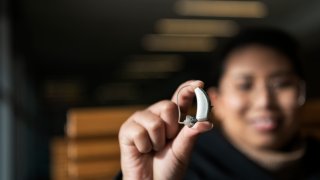
Hearing loss is associated with subtle changes in the brain, and actions that reduce the effort used in understanding speech could also reduce the risk of dementia, a report published Tuesday by UC San Diego researchers found.
According to the report, published in the Journal of Alzheimer's Disease, hearing loss affects more than 60% of adults aged 70 and older in the United States and is known to be related to an increased risk of dementia.
To better understand the connection, a team of UCSD and Kaiser Permanente Washington Health Research Institute researchers used hearing tests and magnetic resonance imaging to determine whether hearing impairment is associated with differences in specific brain regions.
The finding revealed that people enrolled in the observational study who had hearing impairment "exhibited microstructural differences in the auditory areas of the temporal lobe and in areas of the frontal cortex involved with speech and language processing, as well as areas involved with executive function," the report reads.
Get San Diego local news, weather forecasts, sports and lifestyle stories to your inbox. Sign up for NBC San Diego newsletters.
"These results suggest that hearing impairment may lead to changes in brain areas related to processing of sounds, as well as in areas of the brain that are related to attention," said principal investigator Linda McEvoy, UCSD Herbert Wertheim School of Public Health and Human Longevity Science professor emeritus and senior investigator at the Kaiser Permanente Washington Health Research Institute.
"The extra effort involved with trying to understand sounds may produce changes in the brain that lead to increased risk of dementia," McEvoy said. "If so, interventions that help reduce the cognitive effort required to understand speech — such as the use of subtitles on television and movies, live captioning or speech-to-text apps, hearing aids, and visiting with people in quiet environments instead of noisy spaces — could be important for protecting the brain and reduce the risk of dementia."
McEvoy designed and led the study while at UCSD in collaboration with investigators who gathered data from the Rancho Bernardo Study of Health Aging, a longitudinal cohort study of residents of the Rancho Bernardo suburb in San Diego that launched in 1972.
Local
The results show that hearing impairment is associated with regionally specific brain changes that may occur due to sensory deprivation and to the increased effort required to understand auditory processing stimulations.



